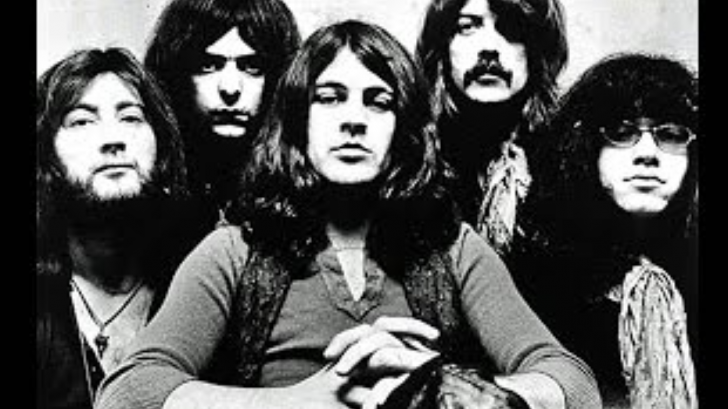We are going to talk about 1973, an essential year for almost anything classic rock, in which a good number of musicians arise or are consecrated that are still a reference today.
New York Dolls — Personality Crisis
The first song on David Johansen’s first album is a riotous piece of classic rythm ’n’ blues passed through a hedonistic glam sieve and a little bit of hooliganism. Sung with a clean bellow, it is a hilarious out-of-control artifact that in the end, how could it be otherwise, ends up crashing. The “Personality crisis you got it while it was hot / But now what you have is frustration and heartache” was like a glove.
Rory Gallagher — Tattoo’d Lady
A story of traveling artists, of life on the road that seems to have always attracted Gallagher and that he takes advantage of to draw parallels with his own profession. A perfect blues rock song published in the sweetest moment of its author, once independent from his band Taste, in full expansion of sounds and influences and with a prolific production, which nevertheless never led him to be a star.
Deep Purple — Smoke on the Water
In one of the first loops in comments on the list, specifically in the first installment, the controversy was created that without the riff, certain songs remain in the middle of what they are. “Smoke on the Water” could not be missing among the examples of that questionable fact, but there are riffs that no longer only transcend songs, but entire groups. Hum the Ritchie Blackmore guitar riff for two seconds and your interlocutor in the vast majority of cases will keep humming it in full for a while. So much for this story of how Deep Purple were left without a recording location thanks to the P.I. on duty at a Frank Zappa concert.
Iggy Pop & The Stooges — Search & Destroy
The history of Raw Power (Columbia) is long known: three years after Fun House (Elektra, 1970), The Stooges meet in London after having incorporated James Williamson on guitar, they record a handful of even wilder songs, still Cruder than his two previous works and they perform a mix between the unworthy and the inexplicable. The record company, frightened by the possibility of releasing the songs produced by Iggy Pop, makes it an inescapable condition that David Bowie remix them again. The Stooges, what a remedy, they accept. Raw Power goes on sale, its success is moderate, and Columbia terminates its contract. And end. For the story, possibly the song on which much of the Punk and subsequent Garage is based: ‘Search & Destroy’.
Elton John — Funeral For a Friend / Love Lies Bleeding
Far from the character of the British show business in which he has always moved wonderfully, Elton John enjoys great artistic prestige, especially thanks to his work in the seventies. Goodbye Yellow Brick Road (MCA) is today one of his most notorious hits, and in it ‘Funeral For a Friend / Love Lies Bleeding’, the double opening song of more than ten minutes whose first half It is an exercise in Progressive Rock at the height of the great names of the time. Recorded like the rest of the album at the Château d’Hérouville, ‘Funeral For a Friend / Love Lies Bleeding’ continues in its second half in the most recognizable and equally inspired tone of Elton John.
The Allman Brothers Band — Ramblin’ Man
Duanne Allman passed away in tragic circumstances, The Allman Brothers Band responded to his absence by distributing the leadership and adding to the equation a very reliable pianist like Chuck Leavell. The result was an unexpected success that was undoubtedly dedicated to the one who, with only three albums signed, was already considered one of the best guitarists in history. ‘Ramblin’ Man ’is an example of that division of responsibilities, with a Dickey Betts at the microphone singing a hymn clinging to the roots that is still valid today. The band, in a state of grace.
Iggy Pop & The Stooges — Gimme Danger
It is fascinating to analyze how much The Stooges managed to achieve with just three albums released in the narrow margin of four years, somewhere between the 60s and the 70s. To understand what songs like ‘Gimme Danger’ meant at the time, there is no more than listening to what his contemporaries were doing at the beginning of the decade. Even the most revolutionary back then sounded like nuns in comparison.
Lynyrd Skynyrd — Free Bird
The ’70s gave us a few memorable guitar solos, but few are capable of overshadowing that of’ Free Bird ‘, the great ballad from Lynyrd Skynyrd’s debut album. Much can be said for and against a band determined to represent without any complexity the entire South American essence, but when faced with issues like this one can only forget prejudices and let go.
Brian Eno — Baby’s On Fire
Almost no-nonsense and distorted glam rock, this cut, featured on Eno’s debut Here Come the Warm Jets, is particularly known for Robert Fripp’s chilling, nearly three-minute guitar solo, which runs through and dissects it. almost from start to finish. A surreal story of unhealthy atmospheres and a kind of strange humor.
Faust — Krautrock
This being Hypersonic, it was already taking the first 12-minute song to come out. But he had to enter this monumental suite sooner, a perfect example of that style that would emerge in Germany in the late 1960s as a kind of avant-garde and electronic response to British and American psychedelia. The label was an invention of the British press with a distinctly disparaging undertone and Faust, like most of those who were into it, rejected it.

